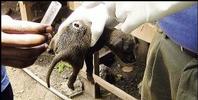Leonardo Blair, Enterprise Reporter
Field officer with the National Screw Worm Programme removes samples from a screw worm-infested puppy in St. Andrew last week. - Leonardo Blair Photo
PERMANENT SECRETARY in the Ministry of Agriculture, Donovan Stanberry, disclosed on Friday that the National Screw Worm Eradication Programme will be revamped significantly to eradicate screw worms from Jamaica by April 2007.
Responding to a Sunday Gleaner article last week which looked at concerns over the project's ballooning cost, public health implications and protracted timeline, Stanberry explained that a streamlined proposal to eradicate the deadly screw worms by April 2007 is now on the table and will go to Cabinet shortly.
Auditor-General Adrian Strachan had raised serious bookkeeping concerns about the integrity of the programme's claims and statistics in his March 2005 report. The report disclosed that several extensions of the 2001 completion date had been granted and the project's cost had escalated from the initial estimated $324 million to $1 billion at the end of March 2005, without successfully eradicating the worm.
Local veterinarians also argued that it would be a major blow to the domestic scientific community if Jamaica became the first country in the world to fail to eradicate screw worms using the sterile insect technique. In this technique, pupae (insects at the immobile non-feeding stage of development) are imported (from Mexico) and bred in laboratories to be developed into flies. These flies are then made sterile and released into the air to mate with other female flies.
Stanberry, who has been in his post at the Ministry of Agriculture for about three months, said he invited senior officials of the United States-Mexican Com-mission to Jamaica late last month to discuss how the programme, which should have ended in 2001, could be successfully terminated. The officials, he explained, have indicated their willingness to reduce the price of the sterile flies used in Jamaica's screw worm eradication programme.
"I have since received the new estimates to complete the programme by April 2007, plus a maintenance period of six months," said Stanberry in a letter to the editor. " This will include increasing the programme by changing the management arrangements and increasing the number of field officers for surveillance," he further explained.
Measures are also being put in place to prolong the life of the flies so that adverse weather conditions will not disrupt the programme dramatically. Poor weather conditions was one of the major obstacles cited for the incompletion of the project
Known in the scientific community as Cochliomyia Hominivorax, 'eater of man,' screw worms cause destructive infestation through larvae deposited by screw worm flies in open wounds or other openings in warm-blooded animals including humans and can cause death.

